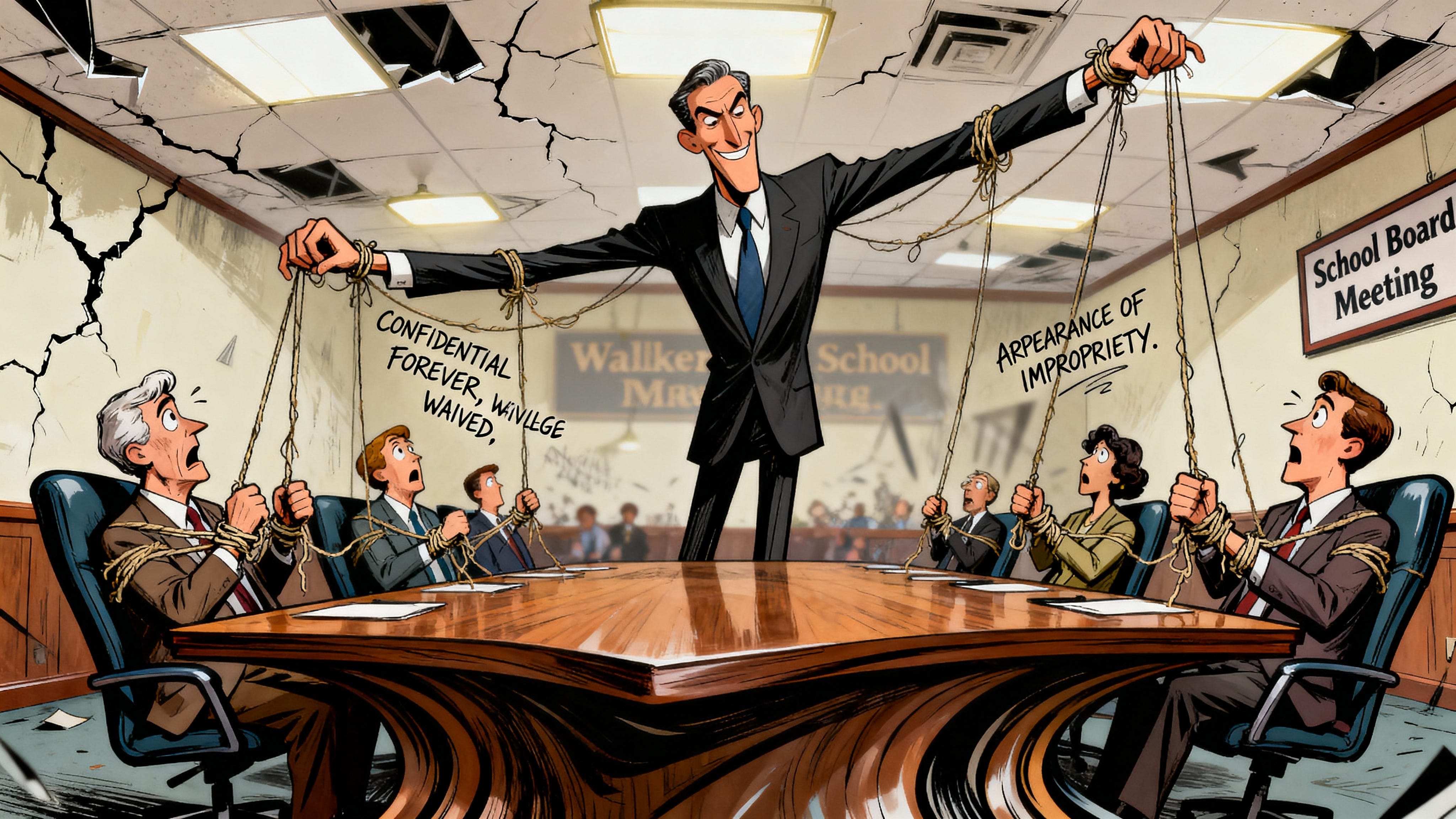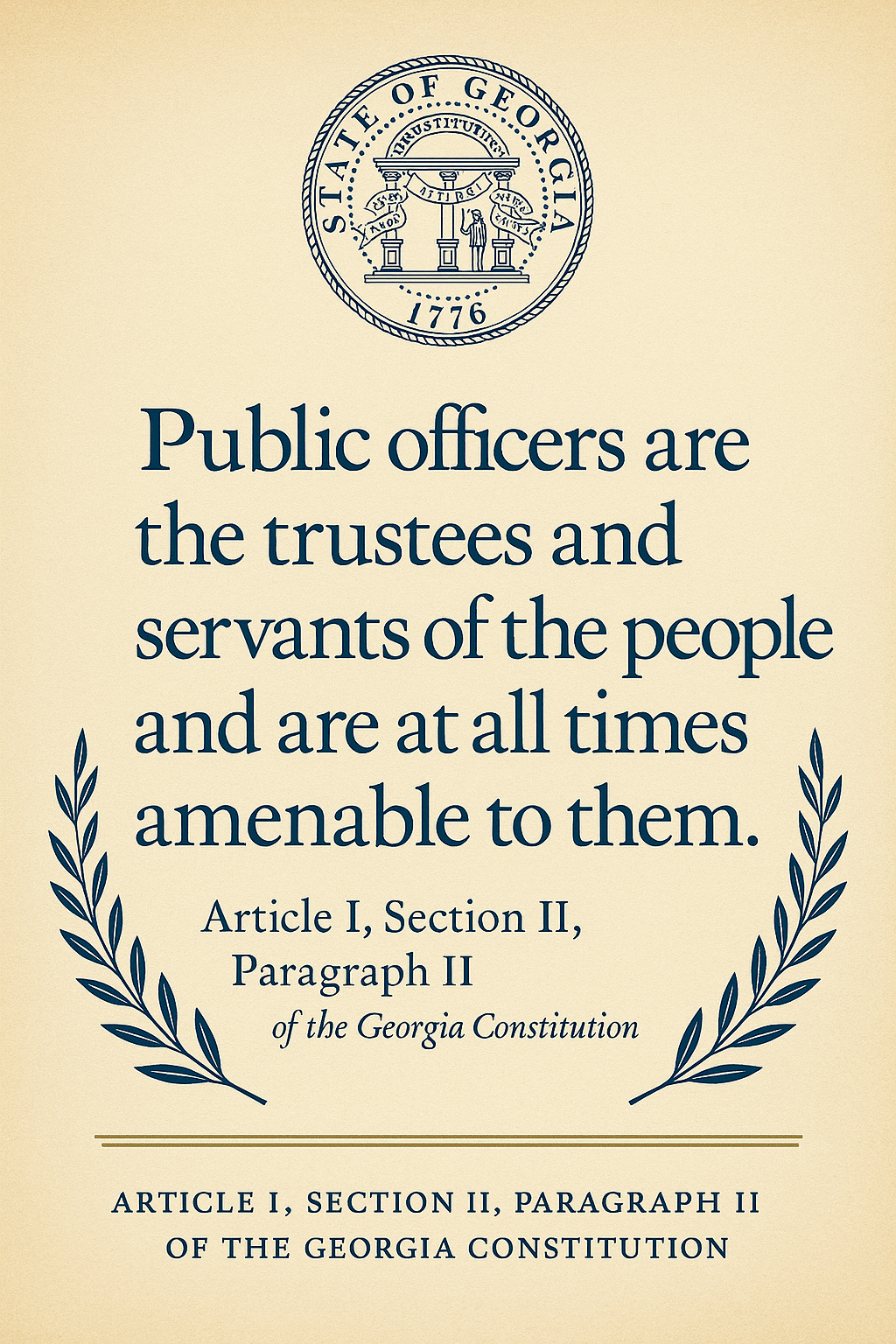Walker County Cannot Fix Its Schools Until It Fixes Its Legal Advice
Five minutes in July gave the public and the school board a small glimpse of the trouble you buy when you trust the wrong lawyers.
The most dangerous moments in government rarely arrive with shouting. They slip in quietly. They sit at the end of a meeting, ask for a few minutes, and offer “guidance” that sounds sensible until held up to the light. That is how bad governance gains a foothold. Not through force, but through the soft confidence of someone who sounds authoritative while steering elected officials away from the people they actually serve.
Walker County witnessed exactly that when one of their Board attorneys stood up and delivered a short guidance statement about executive session confidentiality. His guidance was clear, confident, and recorded in the official minutes for posterity.
It was also breathtakingly wrong.
At the close of the July 21, 2025 called session, one of the board’s attorneys stated he still had the floor and would like to address one more item. (Minutes linked here)
“ There are a couple of quick matters that I’ve been asked to briefly speak on by Mr. Womack, so I’m just going to quickly address those. Those are related to a couple of provisions in the Code of Ethics. The first one comes from GADOE Board Meetings provision number five and it states to maintain the confidentiality of all discussions and other matters pertaining to the Board and school system during the Executive Session of the Board. One provision of the Code of Ethics simply states that whatever is said in Executive Session stays in Executive Session. It is not to be divulged to anybody; regardless of who they are. Just keep that in mind. I know there has been some opinions that are floating around out there that somebody has in the public sector that there is nothing that prevents a school board member from divulging what is said in Executive Session and that is flat wrong. It is completely contrary to what the provision is in the Code of Ethics. The second is actually to go along with that; if you divulge what goes on in Executive Session, you waive the provision of confidentiality and action in Executive Session. So lawyers like me can then begin to compel you to divulge what was said in that Executive Session if somebody breached that confidentiality and we definitely don’t want that happening. The second provision is under the heading of Conduct as a Board Member and is number four: Take no private action that will compromise board or school system administration. I interpret that means to avoid the appearance of impropriety and don’t take any action that can either be construed to compromise your position as a Board member or be construed to compromise the order of the Board or for the school administration. Always remember the public is watching. You may not feel the public watching and maybe you do. I have never been in an elected position, so I wouldn’t know, but I’m sure you do feel the public watching. Always remember the public is watching and you want to avoid the appearance of impropriety. Whatever action you take is a reflection of the Board and the school administration and that those actions reflect the Board again. So, these Codes of Ethics are in place to protect first of all you. You are the elected official and the Code of Ethics is there to protect you so you can perform the duties you’ve been elected to do. So you can serve the people you’ve been elected to serve. So, if you will keep these in mind and always act in accordance thereof; everything will be just fine and you as members of the Board will be successful and this hopefully will be fulfilling. Those are just a couple of things I was asked to just briefly address and with that I am finished.”
The message from the attorney was simple. Executive session confidentiality is absolute. Forever sealed. Anyone who suggests otherwise is “flat wrong.” Anyone who reveals what happened behind closed doors waives privilege for the entire Board, exposing everyone to legal compulsion.
There’s just one problem. None of this resembles Georgia law or board ethics policy.
Start with his core claim. Executive sessions are not vaults. They’re temporary exceptions to Georgia’s Open Meetings Act, which begins from the opposite premise: openness is the default, secrecy is rare and regulated. The law punishes officials who hide public business unlawfully, not those who expose unlawful secrecy. The board attorney presented the framework totally backwards.
Then came his warning about waiving privilege. If one member discloses executive session content, he claimed, lawyers can force the entire Board to reveal everything. This would be news to the Georgia courts. Privilege belongs to the Board collectively and can only be waived by majority vote. Judges—not attorneys—determine whether statements lose protection. If his version were true, every disgruntled official in Georgia would hold veto power over their colleagues. One rogue member could detonate confidentiality at will. The state would be ungovernable.
Next, the taxpayer funded board attorney instructed the School Board to avoid any “appearance of impropriety.” That language doesn’t exist in the Board’s ethics code. It comes from judicial ethics, where judges must maintain distance from parties in their cases. School board members have the opposite obligation. They must engage closely with parents and their communities. They must ask hard questions and challenge administrators and leadership when necessary. Under the board attorney interpretation, a board member who asks hard questions could be branded unethical for daring to scrutinize the administration. That is not ethics. That is institutional protectionism.
The pattern is in his guidance is unmistakable. Silence equals safety. Transparency invites danger. Questioning the administration suggests ethical problems. Loyalty should flows inward to the institution, not outward to the public that elected the board.
The finale was the most revealing part. He told the Board that ethics codes exist to protect them. Georgia’s Constitution says the opposite. Public office is a public trust. Officials are servants of the people. Ethics rules protect the public from officials, not officials from the public.
Now put yourself in the position of a Walker County school board member sitting in that room.
Your attorney just told you that revealing executive session content waives privilege for everyone. That asking tough questions creates an appearance of impropriety. That confidentiality is absolute. All three statements range from misleading to flatly false. But you don’t know that, because you’re not a lawyer—that’s why you hired him.
Now you know the truth.
How do you vote now? How do you deliberate going forward? How do you fulfill your oversight duties when your own counsel has given ample reason to question their every word?
This is not a theoretical problem.
The question isn’t whether counsel intended to mislead the Board. Intent is irrelevant. What matters is impact. When an attorney provides guidance this deeply at odds with established law, elected school board members cannot function. They cannot ask informed questions. They cannot know their rights, their duties, or be sure of their role. They cannot tell whether they’re being protected or controlled.
Once you realize your lawyer has egregiously misstated the law to you—in public, on the record, with complete confidence—trust is gone. Not damaged. Not strained. Gone. And attorneys who have forfeited trust cannot serve their clients, no matter how many clarifying statements or memos they might produce afterward.
Walker County’s Board should thank the firm of Womack, Rodham, and Ray for their years of service and immediately relieve them of their duties. Not because mistakes are unforgivable, but because governing while taking advice from attorneys you cannot trust is impossible.
Board members cannot do their jobs if they don’t know the law. They cannot know the law if their attorneys won’t tell them the truth. And they cannot serve the public if their lawyers serve the institution, administration and bureaucracy instead.
Walker County deserves better. So does every citizen who depends on their school board to govern an immensely important entity in their community. No one can govern well while taking advice from someone they cannot trust.





